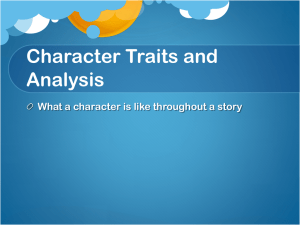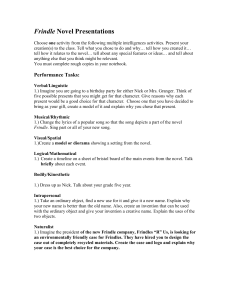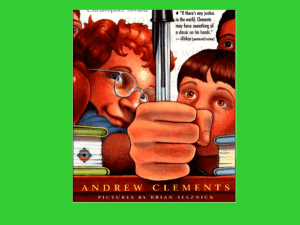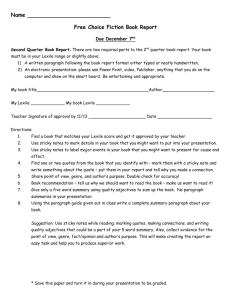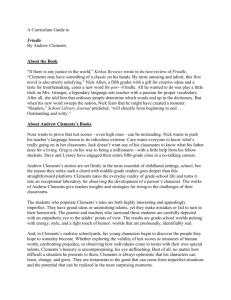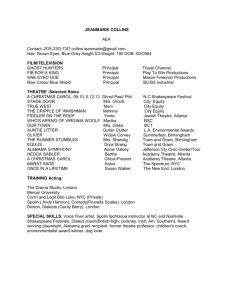Look . . STOP AUDIENCE RESPONSIBILITY
advertisement
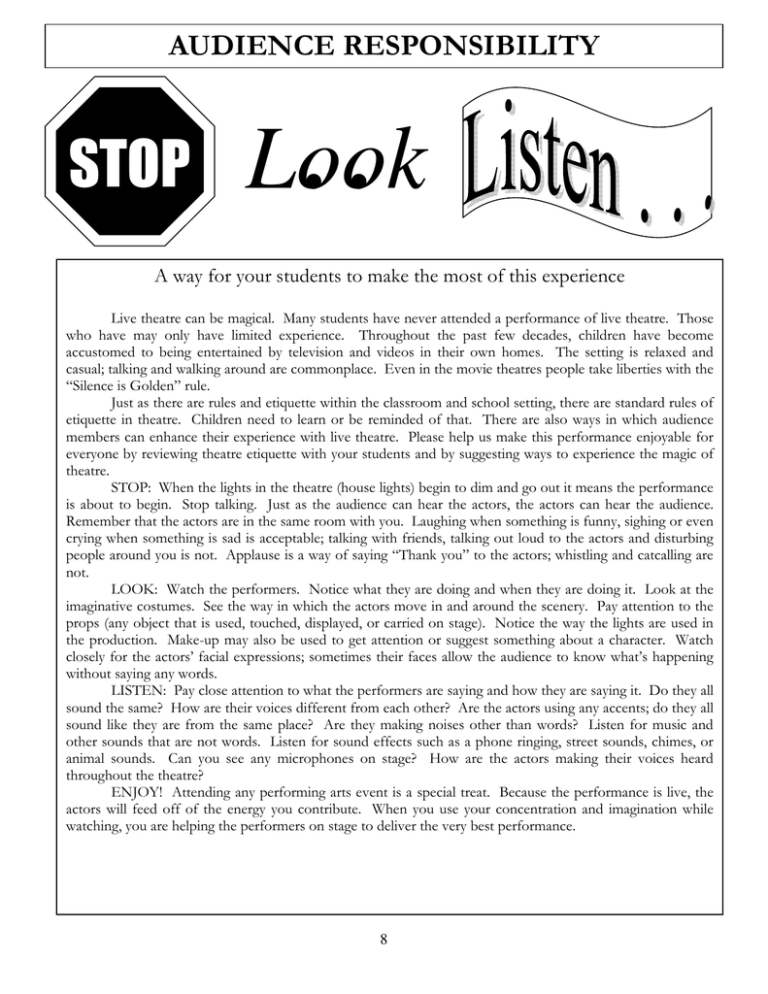
AUDIENCE RESPONSIBILITY STOP Look .. A way for your students to make the most of this experience Live theatre can be magical. Many students have never attended a performance of live theatre. Those who have may only have limited experience. Throughout the past few decades, children have become accustomed to being entertained by television and videos in their own homes. The setting is relaxed and casual; talking and walking around are commonplace. Even in the movie theatres people take liberties with the “Silence is Golden” rule. Just as there are rules and etiquette within the classroom and school setting, there are standard rules of etiquette in theatre. Children need to learn or be reminded of that. There are also ways in which audience members can enhance their experience with live theatre. Please help us make this performance enjoyable for everyone by reviewing theatre etiquette with your students and by suggesting ways to experience the magic of theatre. STOP: When the lights in the theatre (house lights) begin to dim and go out it means the performance is about to begin. Stop talking. Just as the audience can hear the actors, the actors can hear the audience. Remember that the actors are in the same room with you. Laughing when something is funny, sighing or even crying when something is sad is acceptable; talking with friends, talking out loud to the actors and disturbing people around you is not. Applause is a way of saying “Thank you” to the actors; whistling and catcalling are not. LOOK: Watch the performers. Notice what they are doing and when they are doing it. Look at the imaginative costumes. See the way in which the actors move in and around the scenery. Pay attention to the props (any object that is used, touched, displayed, or carried on stage). Notice the way the lights are used in the production. Make-up may also be used to get attention or suggest something about a character. Watch closely for the actors’ facial expressions; sometimes their faces allow the audience to know what’s happening without saying any words. LISTEN: Pay close attention to what the performers are saying and how they are saying it. Do they all sound the same? How are their voices different from each other? Are the actors using any accents; do they all sound like they are from the same place? Are they making noises other than words? Listen for music and other sounds that are not words. Listen for sound effects such as a phone ringing, street sounds, chimes, or animal sounds. Can you see any microphones on stage? How are the actors making their voices heard throughout the theatre? ENJOY! Attending any performing arts event is a special treat. Because the performance is live, the actors will feed off of the energy you contribute. When you use your concentration and imagination while watching, you are helping the performers on stage to deliver the very best performance. 8 STORY MAP Name of Story _____________________________________ Setting Characters Problems Resolution s Event Event Event Event 7 VENN DIAGRAM 6 Vocabulary Words superintendent scholarship established celebrity adoption hooligan villain stubborn leisure dictionary devious instructions report concentration complex etymological definition brilliant detention discuss commotion maverick disruption punishment history oath library quiz challenge overreaction vandalism disrespectful forbid principal opinion perspective foolishness appointment trademark preliminary episode educate invent manufacture media perseverance remarkable boycott graduation arbitrary coinage endure • Arrange these words in alphabetical order. • Using a dictionary, find definitions. • Write a story using these words. • Create (students or teachers) a crossword puzzle. • Find root/base words within vocabulary words. • Explore origins and meanings of various base words. • Explore origins and meanings of affixes. • Categorize words according to their parts of speech. • Many words have smaller words within them (not necessarily their root/base words). Find example of these small words in the vocabulary words. Letters need to be consecutive. Cast of Characters • Nicholas Allen, the school’s “idea man” and the story’s main character • Mrs. Granger, famously strict fifth grade teacher • Howie, Janet, and Chris, Nick’s classmates • Mrs. Chatham, principal of Lincoln Elementary School • Judy Morgan, reporter for the Westfield Gazette • Bud Lawrence, businessman and “Frindle” merchandiser 5 AFTER you see the show: • Choose three people who have had a positive impact on your life. Write about each one and tell what they have done to influence you. • Use the same activity, but this time, write a letter to each of those people, telling them what they’ve done to help you. • Make a list of your character traits. Include your strengths and weaknesses. • Use the triple Venn diagram (see page 7) to compare and contrast any three characters from the play. • Use some of the vocabulary activities suggested on page 5. • Pretend you are a theatre critic: Write and present to the class your view of the play, Frindle. You may want to present your review with another class member in an “Ebert & Roeper” type format. • Write a review of the book or play for the school newspaper. • Read other books by Andrew Clements. • Practice writing dialogue by imagining a scene between one of the characters and his/her parents. • Write a letter from one character in the play to another. • Use a story map (see page 8, or use a map of the students’ own design) to follow one of the characters in the play. • Discuss perseverance. Describe a time when you had to stand up for what you thought was right. What happened? • Interview your mom or dad about their own experiences with perseverance. What helped them to “stay strong”? • Create a word of your own. What does it mean and how would you use it? See if you can get other people to use the word as well. • What is something in your school or community that you would like to see changed? Can you come up with positive alternatives to this issue? What are things that you and your classmates could do to help bring about this change? Do you feel strongly enough about this issue to work for it. 4 ABOUT THE AUTHOR Andrew Clements is the author of several picture books, including Big Al and Bill and the Bad Teacher. He taught in the public schools near Chicago for seven years before moving east to begin a career in publishing. The idea for Frindle grew out of a talk he gave about writing to a group of second graders. He says this about the book: “Frindle is . . . about discovering the true nature of words, language, thought, community, and learning. It’s also about great teaching and great teachers, and about the life that surges through corridors and classrooms every school day.” Mr. Clements lives in Westborough, Massachusetts with his family. ACTIVITIES* & CURRICULUM CONNECTIONS *These activities cover a range of grade levels from 4-8. Feel free to adapt any of them to make them appropriate for your grade level and students’ abilities. BEFORE you see the show: • Create a classroom display of all the books by Andrew Clements. • OR you might choose to focus on Frindle. • Read and discuss Frindle. • Introduce vocabulary words and use various activities (see page 5). • Introduce the cast of characters. Ask students to describe, either orally or in writing, what they think some of the characters might look like (see page 5). • Ask students to discuss perseverance. What does it mean? Are there times when it is a bad idea to not back down, or is it always good? If there are times when it is inappropriate, how can you tell the difference between those times and the times it is good? • Ask students what they think is worth “fighting for”. • Ask students if they have ever felt picked on, or treated unfairly by a parent or teacher or any other authority figure. Were they ever able to see how this person might have been trying to help them? • Is conflict always bad? How can conflict be handled to allow for positive results? 3 The Griffin Theatre Company Mission The mission of the Griffin Theatre Company is to create extraordinaryand meaningful theatrical experiences for both children and adults by building bridges of understanding between generations that instill in its audience an appreciation of the performing arts. Through artistic collaboration the Griffin Theatre Company produces literary adaptations, original work and classic plays that challenge and inspire, with wit, style and compassion for the audience. Griffin Theatre Touring Productions The Stinky Cheese Man & Other Fairly Stupid Tales Based on the book by Jon Scieszka and Lane Smith adapted by William Massolia Frindle based on the book by Andrew Clements adapted by William Massolia LETTERS HOME Adapted for the stage by William Massolia 2 based on the book by Andrew Clements adapted by William Massolia Welcome! We are delighted that you’ve chosen to bring your students to attend our production of Frindle. This is a wonderful opportunity for teachers and students to explore the performing arts. You can discover new ways of integrating arts exploration into ongoing work in the classroom. We hope to give you some ideas, and we hope you will share the arts methods you already use to maximize instruction. TABLE OF CONTENTS Synopsis . . . . . . . . . . . . . . 1 Mission . . . . . . . . . . . . . . . 2 Touring Productions . . . . 2 About the Author . . . . . . 3 Activities and Curriculum Connections . . . . . . . . . . . . . . . . . . . . 3-5 Venn Diagram . . . . . . . . . 6 Story Map . . . . . . . . . . . . . 7 Audience Responsibility ......................8 Study Guide Synopsis: The play opens with Mrs. Granger, an elderly, distinguished teacher, grading papers when the mail arrives. She is informed by the superintendent that a permanent, million dollar trust fund for college scholarships has been set up in her honor. Mrs. Granger passes it off as a trick until she learns that the fund was established by a former student of hers, Nicholas Allen. The play then flashes back to over ten years ago when Nick was starting fifth grade at Lincoln Elementary School. He and several of his friends were dismayed to find that their language arts teacher was to be the dreaded Mrs. Granger, who was notorious for her long homework assignments. Nick responded rather coolly, however, because he was known throughout his class as the “idea man”, who could invent ways to get everyone out of class work. Everyone was still reeling from his bug stunt last year which involved turning the thermostat up and dumping sand all over the classroom to create a beach party. The class was so busy cleaning up, there was never an opportunity to do any work, or even to receive a homework assignment. All the kids in Nick’s language arts last year were more than confident that Nick would come up with something just as good this time. In the last moments of class, after Mrs. Granger had finished her lecture on the importance of words and their definitions, and just before she was about to sentence the entire class to what was sure to be the longest homework assignment ever, Nick’s hand shot into the air. He’d come up with the perfect question to keep Mrs. Granger talking well past the ring of the bell: “Where do words come from?” Mrs. Granger was not taking the bait, though, and she took this opportunity to allow Nick to teach the class, himself. Nick was to research his own question and write up a report, in addition to the homework that was assigned to the rest of the class. This proved to be the beginning of Nick’s experiment with words, as well as his power struggle with Mrs. Granger over what constituted a “real word” in the first place. It was then that Nick decided to create a new word to replace “pen”: Frindle. The feud between Nick and Mrs. Granger then spread over the whole school, then the town, then throughout the entire country. The struggle went on and on, with neither conceding until finally Nick’s new word was printed in the latest edition of the dictionary. By the play’s end, we find that Mrs. Granger not only taught Nick about the importance of words and their origins, but also about having the courage to stand up for himself when he faced opposition. In the final moments of the play, Nick thanks Mrs. Granger for the lessons, and, as a token of his gratitude, offers her a gift that she can call by any name she chooses. 1
